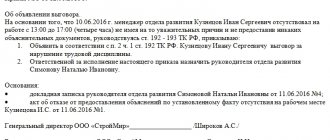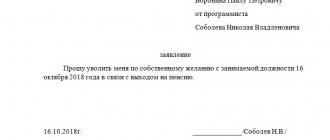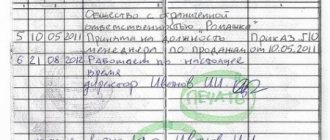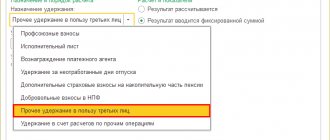What is a reprimand and how does it differ from a remark?
Article 192 of the Labor Code of the Russian Federation provides for various disciplinary sanctions. One of them is a reprimand, which is assigned for improper performance of official duties . The decision on the exacting measure is made by the manager , of which the employee is notified.
Attention! A working citizen cannot be punished more than twice for the same violation of discipline or failure to perform duties.
Article 192 of the Labor Code provides for another type of disciplinary sanction - reprimand . In legal terms, a reprimand and a reprimand do not differ from each other, since they have the same force and the same consequences, as well as the procedure for drawing up a punitive measure. However, we can conclude that the remark refers to a more lenient type of penalty .
Free legal consultation
+7 800 350-51-81
The remark serves as a kind of signal to which the offending employee must heed. A responsible and diligent working citizen must calmly listen to criticism of himself from management and take measures to ensure the proper performance of work duties.
Is it possible to fire an employee for reprimands and in what cases?
The Labor Code has Article 81, which provides for termination of an employment contract at the initiative of the employer. The article describes in detail the list of grounds for mutual termination.
Among others, the article regulates such grounds for dismissal as:
- Repeated failure by an employee to fulfill his direct official duties, if there is a disciplinary sanction against the working citizen.
- A single, but gross violation of discipline or a gross violation of one’s official duties.
Thus, the head of the organization has the right to dismiss a worker on his own initiative if the person was subjected to disciplinary action and still continued to improperly perform his duties, or in the case where the employee grossly violated or failed to fulfill his official duties.
Dismissal as a disciplinary sanction
Let us note that an employee can be dismissed on the basis of clause 5 of part 1 of Article 81 of the Labor Code of the Russian Federation only if he repeatedly violates his work duties without good reason.
Violation of labor duties is recognized as repeated if, despite a disciplinary sanction that has not been lifted or extinguished, the employee continues or is guilty of culpable non-fulfillment or improper performance of labor duties.
It is in this case that a new disciplinary sanction in the form of dismissal can be applied to the employee.
Legislative regulation according to the Labor Code of the Russian Federation
A citizen who has violated discipline and has previously been subjected to disciplinary action may be dismissed at the initiative of the employer. The legislator does not directly indicate dismissal for a reprimand under the Labor Code of the Russian Federation as a basis for dismissal from office. But based on the legal meaning of Article 81 of the Labor Code, it will become clear that a penalty can serve as a basis for dismissal from office .
Naturally, each case of violation and failure to fulfill official duties is individual. The application of any penalty provided for by law is determined by the employer at his own discretion.
Who doesn't get fired?
There are quite a lot of beneficiaries in labor law. Certain manipulations cannot be carried out with certain of them. But as for dismissal on the basis of frequently repeated reprimands, it is impossible to dismiss only a pregnant woman. Employees in this position cannot be deprived of their jobs, even if there are significant violations - Art. 261 TK.
This category of workers can be officially reprimanded and removed from office, but dismissal is strictly prohibited. The remaining beneficiaries can be fired without unnecessary delay.
At the same time, you cannot fire a person if he is on sick leave or on vacation. But in this case, you can send a letter to the employee asking for a written explanation. The person, in turn, must give an answer within two days after the official release.
How many reprimands must there be to fire an employee?
Is it possible to fire someone for one reprimand?
At the legislative level, for which an employee can be dismissed is not directly defined Dismissal after a reprimand is considered strictly individually , taking into account many factors: the severity of the disciplinary sanction, the characteristics of the citizen, his performance and other important and significant circumstances.
Thus, the head of an organization can remove an employee from his position on his own initiative, if he has an outstanding penalty and a violation or improper performance of his official duties.
Dismissal for 2 reprimands
Practice shows that often an employer decides to dismiss a person for two reprimands. Again, the number of disciplinary measures is not a basis for dismissal and is not legislated anywhere.
Most managers decide to dismiss an employee after two reprimands, because they believe that the employee does not want to improve, since even the first disciplinary measure did not affect him.
Dismissal for 3 reprimands
The law does not provide for the number of disciplinary measures in the form of a reprimand sufficient to justify dismissal on the initiative of the head of the enterprise. The employer has the right to dismiss a citizen who has violated discipline or improperly performed official duties.
The number of offenses committed does not affect dismissal from office. Here, a lot depends on various factors; you can receive three disciplinary measures for a minor violation or receive one disciplinary offense for gross improper performance of duties. Each case is individual and is considered separately from other cases.
Dismissal for reprimand after maternity leave
By virtue of Article 261 of the Labor Code of the Russian Federation, it is expressly prohibited to apply disciplinary punishment in the form of dismissal to pregnant employees.
According to Article 193 of the Labor Code of the Russian Federation, penalties can be imposed no later than 30 days from the date of the violation of discipline, not counting the period of incapacity of the employee (this also includes maternity leave). At the same time, it is not permitted to apply disciplinary penalties later than 180 days from the date of commission of the labor offense.
For your information
Termination of a contract with an employee for repeated violation of discipline is permissible only if he has previously applied outstanding penalties. The period from the application of these penalties to the dismissal of the employee should not exceed 1 year.
Thus, the dismissal of a woman for a reprimand upon returning from maternity leave will have no legal basis.
Stages of dismissing an employee after a reprimand
Before making a decision to dismiss an employee, the employer must comply with civil law so that the procedure is considered legal.
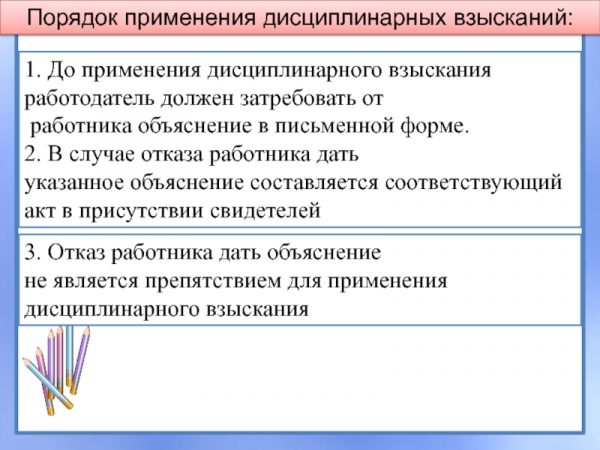
- If a violation of disciplinary duties is detected by a person, the employer is obliged to draw up an act on the discovery of the violation in writing and in the proper form . If necessary, the employer has the right to demand that the offending citizen undergo a medical examination.
- After drawing up a report on the detected violation, the employer is obliged to request an explanation from the employee in writing . The employee has two days to write the explanation.
- The employer, independently or with the involvement of a special commission, considers the valid reasons described in the citizen’s explanation and, based on all the circumstances, makes a decision.
- A written order regarding disciplinary action is drawn up , with which the employer is obliged to familiarize the employee.
- If there are compelling circumstances, the employer, after ordering a disciplinary action, may issue an order to dismiss the citizen. The employee must also be properly familiarized with the order.
- A corresponding entry is made in the work book of the dismissed citizen.
- The head of the organization is obliged to make the final payment , and also, if necessary, issue a certificate of income to the dismissed employee.
Marks in the work book
The rules for what and how to record in work books are comprehensively described in the Rules for their maintenance and storage, approved by Government Decree No. 225. The law directly prohibits entering data on disciplinary sanctions, except if they are in the form of dismissal.
The content of the mark itself should be limited only to information about dismissal; mention of reprimands is prohibited. Examples are freely available online.
Conditions for the correctness of the text: no abbreviations or acronyms of any kind. The HR officer and/or employer signs the mark below, and the entry is sealed with the company seal. In the columns provided for this, enter the date and details of the order.
Entering information about censures into the T-2 form (personal card) is not provided for by law, but is not prohibited by it. It will not contradict the law if a section “Imposed penalties” is added to it and the relevant information is entered there. This can also be specified in the "Additional Information". HR staff do this or don’t record such data anywhere at all.
Employees who cannot be fired for reprimanding
The law establishes a list of persons who cannot be dismissed even on grounds such as a reprimand. This category of citizens includes:
- pregnant women;
- women with children under three years of age;
- parents with a disabled child;
- employees who are the sole breadwinners and have children under three years of age.
In addition, it is impossible to impose penalties and, accordingly, dismiss persons who are on vacation or sick leave .
How to appeal dismissal for a reprimand
A dismissed employee can appeal the employer's dismissal if he considers that the grounds for dismissal were unlawful and unfair. There are three ways to challenge dismissal:
- contacting the labor inspectorate;
- appeal to bodies considering individual labor disputes;
- filing a claim with the district court.
The legislation establishes a time limit for challenging – one month from the moment of familiarization with the dismissal order or receipt of the work book with a record of dismissal.
Attention! To the statement of claim, the dismissed citizen must attach a copy of his passport, a copy of his work record book, and also provide evidence confirming the fact of illegal dismissal from office. The plaintiff can call witnesses who will be ready to testify in favor of the plaintiff at the court hearing. If the outcome of the court hearing is positive in favor of the plaintiff, the citizen is fully restored to his official rights and can continue to fill the position from which he was dismissed.
About payments and compensations
Upon dismissal based on a reprimand, the employer must make a final settlement with the dismissed employee. The calculation should include wages for the time actually worked by the person, as well as compensation for unused vacation . In case of dismissal from a position at the initiative of the employer, severance pay is not paid.
The calculation must be made on the last working day of the employee subject to dismissal. If the employee is absent from the workplace on the last day, the due payments must be made no later than the next day from the written request of the dismissed worker.
Recording in labor
Upon dismissal based on a reprimand, the work book must be filled out in a special way. This rule is spelled out in special government decree No. 225. When issuing a document to a dismissed employee, it must contain the following data:
- employee information;
- information about transfers;
- data on awards received and achievements.
Data on disciplinary sanctions are not reflected in the labor report. The exception is when a person is fired for these violations.
If an employee was fired on the basis of numerous reprimands or for gross violation, the employment record must contain a record that the contract was canceled due to repeated failure to fulfill and violation of labor duties. The article on which the manager relies upon dismissal must be indicated. There are several more rules for registering employment:
- Any abbreviations and various verbal abbreviations are unacceptable.
- The mark on the work record is certified by the signature of the responsible person.
- The organization's seal must be present.
- The date and details of the order for dismissal are indicated in the specially designated fields.
Additionally, a personal card in the T-2 form can be issued. There may be information about reprimands here. It is up to the employer to decide whether to draw it up or not.
How is an entry marked in the labor record?
At the legislative level, there is a list of information that can be entered into the work book (data about the employee, about the enterprise, about acceptance, transfer, dismissal and awards).
Important! It is prohibited to make an entry in the employee’s work book about disciplinary sanctions committed by him. The exception is a penalty in the form of dismissal from office.
When filling out the work book, there must be a note indicating that the employee has been dismissed from his position with a reference to the article of the Labor Code that served as the basis for the dismissal. The corresponding entry must bear the signature of a human resources employee or manager and the seal of the organization.
Sanction repayment terms
Penalty in the form of a reprimand can be used after 6 months from the date of violation. If a special audit was carried out at the enterprise, this period increases to 2 years. Such penalties are lifted automatically. But provided that during this time the person does not receive new penalties. Also, the employer himself can lift the penalty at the request of his employee.
It is impossible to expel an employee for this form of reprimand. The quantity doesn't matter here. In principle, there is no such article in the labor code. Moreover, it is allowed to dismiss a person only for violations for which certain disciplinary sanctions were not applicable. These are the grounds prescribed in Art. 77, 80 Labor Code of the Russian Federation.
So, it is illegal to deprive a person of work directly for receiving reprimands. But you can dismiss only if there are misconduct under clause 5 of Art. 81. If an employee has repeatedly, without good reason, violated his obligations, if he has an outstanding penalty, he may be dismissed and, to some extent, this will be dismissal for a prescribed reprimand.
